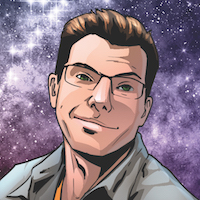The Incal Redux
A little while back, Michael was talking up the amazingness that is the graphic novel The Incal, by Alejandro Jodorowsky and Jean Giraurd (often known as Mobius). Michael adores this comic, and rightly so, it is quite a story. He had me read it over the weekend.
And regrettably, I was unimpressed.
There are, as I look back on the experience, a number of reasons for this.
Firstly, I am in general rather ho-hum when it comes to space magic. I have nothing against using giant alien mutant jellyfish to fight star-eating anti-matter eggs, but I don’t find it interesting. Tell me why the mutant jellyfish are the key, sure, lets do this, but in general I don’t find dream-logic interesting in science fiction. It’s a big part of what has kept me from falling head over heals for Saga. Ironically, I love dream-logic in fantasy. In a world of gods and true other-worldliness, dream-logic is amazing. But there’s something about it in a sci-fi setting that makes it feel lazy to me.
Secondly, the book is very French. I do not know whether it is a cultural difference or a translation issue, but for some reason I find French fiction to have a lack of emotional depth. Characters just seem to say things and have them be so. Everything is taken at face value. Characters wear their emotions on their sleeves and are prone to instantaneous shifts in mood. And this observation holds with my reading of The Incal. Everything happens so quickly that there is not enough time for me to grow attached to any of the characters before they turn into geometric objects, androgynous conjoined twins, or monsters of shadow and darkness.
But most of all, when all is said and done, underneath the sonic bazookas, the homeo-whores, acid pits, sun-eating eggs, techno-scorpions, extra dimensions, and alien mating rituals, The Incal is a very very very familiar story. In fact, it’s one I heard growing up on a regular basis. Nearly every Sunday:
Salvation can only be achieved by rejecting your baser desires and accepting Christ into your life.
John Difool, regularly prays to The Incal (son of the creator of the universe who performs miracles) to help him in his hours of need but when called to sacrifice his wants for the sake of others he balks time and again and ultimately refuses to give himself to The Incal because he wishes to remain himself. In doing so he rejects the ultimate paradise and is returned to purgatory, to live and die again and again until he learns to accept the divine light. Some say this is actually Buddhist reincarnation, as apparently Buddhist philosophy is something Jodorowsky put in many of his works, but honestly it’s kinda six one, half dozen the other to me. It’s still a story of rejecting hedonistic self-interest in favor of spiritual enlightenment.
There’s nothing wrong with that story. It’s a fine story. A great story even. It was just so… familiar, and I was disappointed when I got to the end and that’s what I was left with. After all the wacky nonsense, it all came down to a message of “reject hedonism, embrace Christ” all without any real discussion as to why that’s what you should do. It’s like an inverse fire and brimstone sermon. Instead of threatening with damnation, it cajoles with paradise. The closest it gets to any sort of theological discussion is to show how shitty a world based on hedonism and self-interest is with the Berg galaxy populated by Jondiffs.
While I did call The Incal full of “nonsense and bullshit,” I do agree with Michael. The Incal is absolutely worth the read. It clearly is a story that speaks to people and is widely regarded as a comic book masterpiece. You should read it.
…
And if you happen to like spiritual, soul-searching, theological type stories, I would highly highly highly recommend Midnight Nation by J. Michael Straczynski and Gary Frank.
